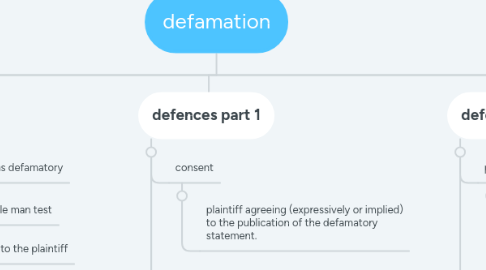
1. definition: to attack a person's reputation.
1.1. libel
1.1.1. defamatory statements in permanent form.
1.1.2. a tort and crime at the same time
1.1.3. "actionable per se"
1.2. slander
1.2.1. defamatory statements conveyed in a temporary form.
1.2.2. only a tort
1.2.3. needs proof of actual damage except:
1.2.3.1. imputing a criminal offence
1.2.3.2. imputing a disease
1.2.3.3. imputing unchastity or adultery to a woman.
1.2.3.4. falsely claiming to own nother person's property or speaking of another person's goods in a negative light.
2. elements:
2.1. 1. statement made was defamatory
2.1.1. using reasonable man test
2.2. 2. statement referred to the plaintiff
2.3. 3. statement was published
2.3.1. making the statement known to any 3rd party
3. defences part 1
3.1. consent
3.1.1. plaintiff agreeing (expressively or implied) to the publication of the defamatory statement.
3.2. fair comment
3.2.1. honest criticism
3.2.2. requirements:
3.2.2.1. the comment was made on a matter of public interest.
3.2.2.2. the statement must be an expression of opinion and not n assertion of fact
3.2.2.3. the comment must be fair
3.3. justification
3.3.1. the alleged defamatory statement was in substance the truth
3.3.2. defendant has the burden to prove that the statement is true, not the plaintiff.
3.4. innocent publication
3.4.1. a situation where defamatory statement is made innocently
3.4.2. the defendant is able to make an offer of amends (an apology)
4. remedies
4.1. payment of damages as compensation
4.1.1. 1. normal damages
4.1.2. 2. aggravated damages
4.1.3. 3. exemplary damages
4.2. injunction
4.2.1. discretionary to the court
4.3. apology
4.3.1. correcting the defamatory wrong that was done.
5. defences part 2
5.1. privilege
5.1.1. absolute privilege
5.1.1.1. cases in which complete freedom of communication is regarded as paramount importance. (with or without malice)
5.1.1.1.1. e.g. statements made in the course of parliamentary proceedings
5.2. qualified privilege
5.2.1. protects the maker of the untrue statement only if the maker acted honestly and with malice.
5.2.2. plaintiff have to prove on the balance of probabilities that the sole or dominant motive of the defendant was to injure the plaintiff.
5.2.2.1. e.g. reports of a parliamentary proceedings (newspaper reports of parliamentary proceedings)
5.2.2.1.1. if the reports are fair and accurate, then they are protected by qualified privilege.

